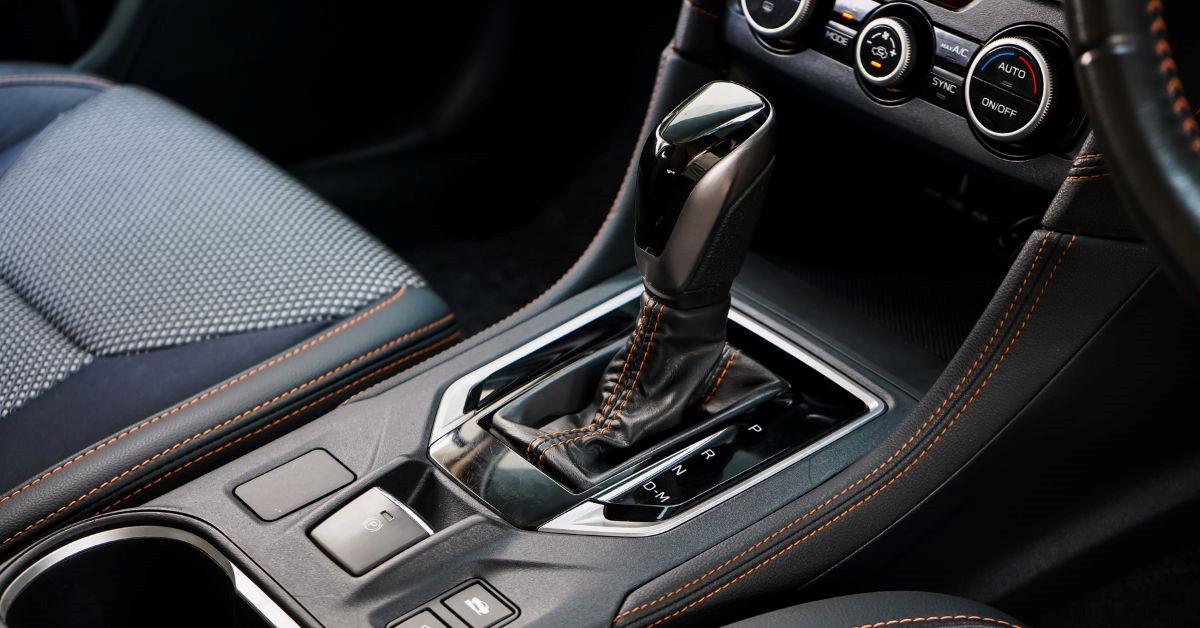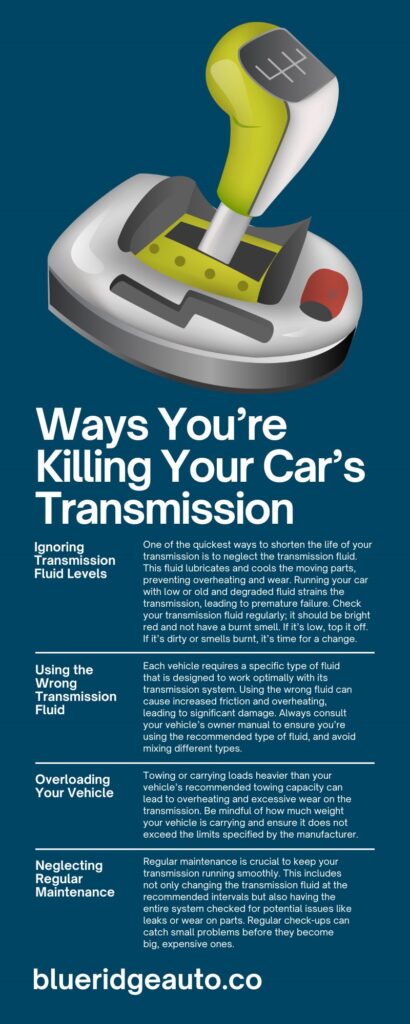15 Ways On How To Keep Your Transmission Healthy

Sharing this:
The transmission is a critical component of your vehicle, responsible for shifting gears and delivering power from the engine to the wheels. Unfortunately, many car owners unknowingly engage in habits that can damage this essential part. Read on to discover some ways you’re killing your car’s transmission and learn how to fix these issues to ensure your vehicle runs smoothly for years to come.
Ignoring Transmission Fluid Levels
One of the quickest ways to shorten the life of your transmission is to neglect the transmission fluid. This fluid lubricates and cools the moving parts, preventing overheating and wear. Running your car with low or old and degraded fluid strains the transmission, leading to premature failure. Check your transmission fluid regularly; it should be bright red and not have a burnt smell. If it’s low, top it off. If it’s dirty or smells burnt, it’s time for a change.
Using the Wrong Transmission Fluid
Just as harmful as low fluid levels is using the incorrect type of transmission fluid. Each vehicle requires a specific type of fluid that is designed to work optimally with its transmission system. Using the wrong fluid can cause increased friction and overheating, leading to significant damage. Always consult your vehicle’s owner manual to ensure you’re using the recommended type of fluid, and avoid mixing different types.
Overloading Your Vehicle
Excess weight puts additional strain on your engine, brakes, and transmission. Towing or carrying loads heavier than your vehicle’s recommended towing capacity can lead to overheating and excessive wear on the transmission. Be mindful of how much weight your vehicle is carrying and ensure it does not exceed the limits specified by the manufacturer.
Neglecting Regular Maintenance
Regular maintenance is crucial to keep your transmission running smoothly. This includes not only changing the transmission fluid at the recommended intervals but also having the entire system checked for potential issues like leaks or wear on parts. Regular check-ups can catch small problems before they become big, expensive ones. Always adhere to the maintenance schedule provided by your vehicle’s manufacturer to maintain optimal performance.
Frequently Accelerating Hard
Frequent hard accelerations force the transmission to work harder, shifting gears more aggressively and rapidly. This habit can cause excessive wear and tear on the transmission over time. To prolong the life of your transmission, accelerate gradually and avoid pushing your engine into the high RPM range unnecessarily.
Not Using the Parking Brake
Not using the parking brake, especially on inclines, can put unnecessary stress on your transmission. When the parking brake is not engaged, the entire weight of the vehicle rests on the transmission, specifically on the parking pawl—a small component within the transmission. This can lead to wear and eventual failure, so always use your parking brake, even on slight inclines.
Ignoring Warning Signs
Many transmission problems start small and worsen over time. Ignoring early warning signs like delays in gear shifting, unusual noises during gear changes, or even subtle changes in driving performance can lead to more significant issues. Address these symptoms early by consulting a professional mechanic to avoid more extensive and costly damage.
Shifting Gears While Moving
Shifting from Drive to Reverse or vice versa while the car is still moving is a bad habit that can significantly strain the transmission. Always come to a complete stop before shifting gears to prevent damage to the transmission’s components.
Skipping the Transmission Cooler
If you frequently drive in hot climates or often haul heavy loads, installing a transmission cooler can significantly extend the life of your transmission. This device helps keep the transmission fluid cool, preventing overheating and reducing the risk of premature transmission failure.
Using the Transmission To Stop the Vehicle
Using the transmission to stop the vehicle, rather than relying on brakes, can lead to rapid wear and tear. This practice is particularly harmful in automatic transmissions where the sudden shift from a high gear to a lower one without adequate deceleration can strain the system. Always use brakes to slow down or stop the vehicle to prevent putting unnecessary stress on the transmission.
Not Resolving Cooling System Issues
The transmission’s performance is closely tied to the engine’s cooling system. A malfunctioning cooling system can cause the transmission to overheat, especially during long drives or under heavy loads. Ensure that your cooling system is in optimal condition by regularly checking coolant levels, the radiator, and associated hoses.
Taking Frequent Short Trips
Taking frequent short trips without allowing the transmission to warm up can also be detrimental. When the transmission fluid does not reach its optimal operating temperature, it cannot provide adequate lubrication and protection, leading to increased wear. Try to combine short trips into longer journeys when possible to allow the transmission to warm up properly.
Following Poor Driving Habits With a Manual Transmission
Following poor habits with manual transmissions, such as resting your hand on the gear shift or not fully engaging the clutch, can lead to premature wear. These actions put unnecessary pressure on the transmission’s components, leading to early failure. Always ensure that you engage the clutch fully and avoid using the gear lever as a handrest.
Ignoring Software Updates
Software plays a crucial role in the operation of the transmission system for modern vehicles with automatic transmissions. Manufacturers occasionally release software updates that improve transmission performance and resolve bugs. Failing to install these updates can lead to suboptimal performance and increased wear. Check with your dealership about necessary updates for your vehicle’s transmission software.
Skimping on Transmission Services
When it comes to maintaining your vehicle’s transmission, opting for cheaper services can cost you more in the long run. Quality transmission services ensure that every aspect of the system is thoroughly inspected and maintained using the right tools and fluids.
Now that you know the top ways you’re killing your car’s transmission and how to fix them, you can take proactive steps to ensure the longevity and reliability of your vehicle. Remember, taking care of your car’s transmission is not just about preventing issues; it’s about investing in the health and efficiency of your vehicle.




